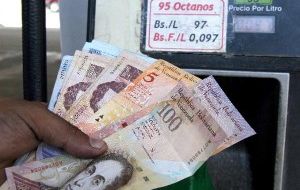MercoPress. South Atlantic News Agency
Venezuela implements new foreign exchange market to contain inflation
 The new system confirms a further devaluation of the Bolivar
The new system confirms a further devaluation of the Bolivar Venezuela central bank set an implicit exchange rate of about 5.3 Bolivar per US dollar in a new currency market that made its debut Wednesday and aims to rein in surging inflation and have greater control over the alternative foreign exchange market.
The central bank established a trading band ranging between 4.3 and 5.3 Bolivar that is based on the prices of the government’s international dollar bonds. The low end of the band is in line with the government’s official exchange rate of 4.3, which is used for imports of non-essential goods.
“About 90% of the operations were done at 5.3” Central Bank President Nelson Merentes said Wednesday in an interview on Union Radio. “We knocked down the price. Demand trailed the 17 million USD of supply, but that’s normal on the first day. Banks are still registering to participate in the market.”
President Hugo Chavez dismantled the unregulated currency market on May 18 after the Bolivar slid to a record low 8.2 per dollar and consumer prices surged the most in seven years in April. He blamed currency speculators for the pickup in inflation and said brokerages, which performed bond swaps for clients to obtain dollars, were fueling capital flight, laundering money and setting artificial exchange rates.
The central bank said that eight banks operated in the new currency market trading 4.97 million dollars- denominated bonds at an average implicit exchange rate of 5.27 per dollar, according to an e-mailed statement.
Venezuelans and companies had turned to the parallel market when they couldn’t get government approval to buy dollars at the official rates of 2.6 and 4.3 per dollar. They used brokerages to access US currency by buying and selling dollar-denominated securities in the unregulated market, which was a legal mechanism to get around the controls.
Companies and individuals can now bid to buy dollar- denominated securities through the new market using banks as intermediaries with a minimum bid of 1,000 USD said Merentes.
Individuals will be limited to 5,000 USD a year and bank clients seeking to buy dollars in the market won’t be able to obtain currency on consecutive days as the market is only for “real necessities” according to Merentes.
Venezuela’s Foreign Exchange Board, known as Cadivi, is meeting 90% of import demand at the official rates, he said. Venezuelans used the unregulated market to import about 30% of goods last year, according to Ecoanalitica.
The market will be supplied initially by as much as 2.7 billion USD in bonds held by local banks and the government may issue debt to boost supply, Merentes said.
The central bank estimates the “real needs” of the market are between 5 and 6 billion USD per year, he added.
Venezuela’s central bank reserves have fallen 23% this year to 26.8 billion USD.




Top Comments
Disclaimer & comment rulesCommenting for this story is now closed.
If you have a Facebook account, become a fan and comment on our Facebook Page!